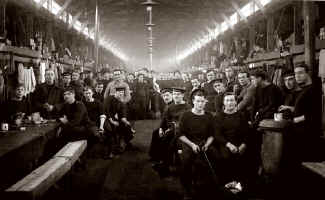|
to
English Camp page
next page
|
Boredom the biggest enemy of interned Britons
The English Camp in Groningen 1914 -1918 (part 5)
This is the fifth instalment from a series of 13 articles on the history of the English Camp in Groningen, where 1,500 British servicemen were interned during the Great War 1914 – 1918.
 |
| Picture of the interior of a residential hut. More than 500 men lived tightly
packed, in an area measuring 240 by 60 feet. |
The internees had a strictly regimented day: wake up call at 6.30 a.m., followed by an hour for washing, shaving and breakfast. At 8.45, the groups were allocated to the morning march and camp duties. Lunch was taken at 12.30. From 1.30pm, another group was put to work, whilst others could keep themselves occupied with their own work, study or sports. Groups of 400 internees were allowed to go to the cinema in the city. At 4.30 pm tea was served, after which those whose turn it was could go on ‘shore leave’ in Groningen. Everyone had to be back in camp at 10 pm. On Sundays, there were no compulsory marches. Instead, the
British could attend church.
It became clear very early on that boredom was the greatest enemy of the internees. Courses were set up in foreign languages, navigation, accountancy and other subjects. Initially, there was not a lot of interest for that. Sports were preferred, and particularly football was very popular. Interest in coursework only took off later, in 1916, when British examiners took officially recognised exams.
There was plenty of time for relaxation: sports, reading, cabaret and music. Sports included athletics, football, tennis and cricket, to name but a few. Competitions took place not just between the men themselves, but also with clubs in the city for friendly matches. Barely a week after arrival a match was played between the internees and the Groninger club GVV, which the internees won 5-0. A large recreational hall was built in the camp early in 1915. Performances were given by the various societies in the English Camp, such as Timbertown Dramatic Society, the Timbertown Operatic Society and the Timbertown Follies. The latter even gave well-attended performances outside the Camp in various Dutch cities. Takings were always forwarded to charity.
Sports and relaxation were not always sufficient to keep everybody occupied, so paid work was organised within the camp. A knitting club was established, where 50 men knitted jumpers and socks for the Royal Navy. Internees could work as carpenter, nurse, writer, cook etcetera. This was quite popular, as the internees received an additional reward on top of the statutory pay of 10 cents per day. This was paid every 10 days. This was equivalent to the wage of a conscript soldier in the Dutch army at the lowest rank. The reward for extra work varied between 10 and 50 cents a day. More than 80 internees made jewellery boxes and photo frames which were sold at Selfridges in London. The proceeds went towards necessary purchases for sports and games.
(For examples click here)
From April 1915, there was an opportunity to work outside the camp on a voluntary basis. More than 60 Britons worked in the coalmines in the southern province of Limburg; others worked at local shipyards, engineering works, small factories, or assisted in the harvest in outlying districts etcetera.
Payment for this extraneous work was not made to the internee at the time, but into a savings fund. After the period of internment had ended, the money would be paid to the persons concerned. Unfortunately, it all turned into an administrative shambles, which saw some receiving too little, others too much. The Dutch government finally washed its hands of the affair, by making payment conditional to the internee signing a declaration that they would accept the money without further claims.
Next: English were popular with the women
  to
English Camp page to
English Camp page
|
|